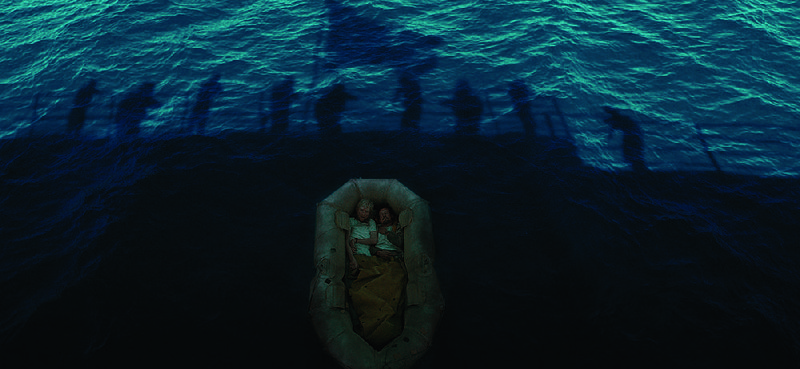Unbroken is one of those movies that come out this time of year -- a rousing, inspirational "true" story based on a best-selling book by a respected author (and let's be clear, the following review ought not reflect on its source material, Laura Hillenbrand's 2010 biography of the remarkable Louis Zamperini). These movies are, by and large, technically excellent, with great big orchestral scores, creamy cinematography and the imprimatur of famous movie stars.
Sometimes they turn out to be the best sort of movies -- wonders of science and art that serve to demonstrate the potency of the motion picture form. More often, they are kind of sterile and coventional, sleek, rich, self-satisfied things. At worst, they are something the whole family can "enjoy," if the family hasn't any grinchy cineastes in tow.
Unbroken
Grade: 75
Cast: Jack O’Connell, Takamasa Ishihara, Domhnall Gleeson, Finn Wittrock, Garrett Hedlund, Alex Russell, Jai Courtney
Director: Angelina Jolie
Rating: PG-13, for war violence including intense sequences of brutality, and for brief language
Running time: 137 minutes
So let me say I don't hate Unbroken, I don't even dislike it. I don't regret the resources that went into making it. It is not a bad movie in the sense that it is inept or morally suspect. It's just a dull and pretty thing, a vapid beauty queen of a picture. It says what it thinks it ought to say about the indomitable human spirit, but its homilies sound rehearsed, uninspired and calibrated to what it perceives as an audience eager for reassurance. I want to pat it on the head and dismiss it.
Maybe it's not fair, but it's impossible to divorce the movie on the screen from the intelligence presumably behind it, the movie star Angelina Jolie. She directed one previous feature, 2011's In the Land of Blood and Honey, which was didactic and wrong-headed but occasionally possessed of a crude power that suggested an inchoate talent for filmmaking. While it's difficult to rouse much sympathy for Jolie, who was characterized in the recently leaked Sony memos as a minor talent and "camp event" -- and who in person seems very much like the sort of Hollywood star who would insist that her lessors not attempt eye contact -- the most honest thing that could be said about Blood and Honey was that it was an odd but distinctive film, the product of an eccentric provocateur. Jolie often didn't seem to trust her audience -- you could certainly question her taste -- but Blood and Honey took some outrageous risks.
Unbroken does not. It is a safe and shiny movie that utilizes highly regarded professionals. Roger Deakins is the director of photography. The Coen brothers took a swipe at the script. The story is unimpeachably uplifting.
And the ultimate effect is like the rich lady who hires the high-priced decorator to furnish her house and arrange for art on the walls. It's pretty, but it's not art, and it's not even all that comfortable.
It tells, in paint-by-numbers fashion, Zamperini's war story, picking up with him as an incorrigible young teen in Depression-era California, the son of poor but striving Italian immigrants sensitive to their provisional status in the New World. Of course young Louis is bullied. Of course he won't give in; he keeps struggling to his feet after being knocked down. This is his defining and only real character trait -- he is the Weeble what wobbles but won't fall down. At one point, after being caught in some childish indiscretion, he screams, "I'm nothing! Let me be nothing!"
(I can only assume that this was an incident described in Hillenbrand's book, for the movie unblinkingly accepts this self-abnegation. I was curious why Little Louis might feel this way. Jolie, apparently, was not.)
Anyway, encouraged by his brother, he -- like Forrest Gump and Alan Turing -- started to run. Which led him ultimately to the 1936 Berlin Olympics, where he was a teammate of Jesse Owens' and, though Jolie elides this bit, was singled out for praise by an impressed Adolf Hitler.
Next thing we know, he's a grown-up bombardier (played by Jack O'Connell) on a B-24 in the Pacific Theater during World War II. A rescue mission goes wrong and he's suddenly lost at sea, floating in a raft in the middle of the ocean with two other survivors, Phil (Domhnall Gleeson) and Mac (Finn Wittrock).
After 47 days he's "rescued" by the Japanese navy and plunged into a series of horrors at an internment camp, where he's singled out for abuse by a sadistic corporal (Takamasa Ishihara, aka the pop star Miyavi) who speaks beautiful English but has a penchant for dreary macho nonsense. (There's a particularly risible moment when he hisses, "You are like me!" at the object of his disturbingly intimate attention.)
The long-feeling interval in captivity feels lifted from better movies, like the David Lean classic Bridge on the River Kwai or Nagisa Oshima's Merry Christmas, Mr. Lawrence (1983), which cast David Bowie as the central Christ-like martyr.
Though if you know anything about Unbroken, you probably know that Zamperini survived -- he was the ultimate survivor. And that's a good thing to be. Because, you know, you can do it. If you just believe hard enough.
There's an odd phrase that gets a lot of circulation in this film: "A moment of pain is worth a lifetime of glory." I cannot for the life of me make out what that means. It makes sense the other way around -- if you can just endure this pain, well, you've got the rest of your life to live. But this locution is just grand-sounding and empty, like the film itself.
MovieStyle on 12/26/2014
